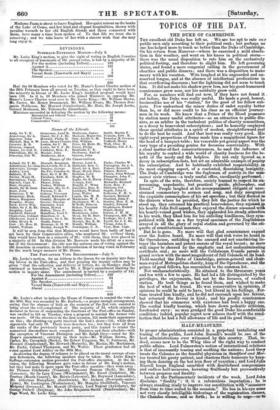TOPICS OF THE DAY.
THE DIME OF CAMBRIDGE.
THE excellent old Duke has left us. We are too apt to rate our public men only according to their political rank ; but perhaps no one has helped more to teach us better than the Duke of Cambridge. On his return from Hanover—where he exercised a mild absolu- tism in fair weather' and went on his knees in political storm— there was the usual disposition to rate him on the exclusively political footing, and -therefore to slight him. He left governing states, and found a more congenial calling in the government of
charities and public dinners; and there was a disposition to make merry with his vocation. Wits laughed at his unguarded and un- reserved tongue, and at the absence of intellectual predications in that overflowing discourse; but the lightning did not seem to touch him. It did not make his shadow grow less, nor his good-humoured countenance grow sour, nor his assiduity grow cold. For, as numbers will find out now, if they have not found it
out before, the Duke was really useful. He made a good, honest, businesslike use of his " station, ' for the good of his fellow sub- jects. Few understood the minor duties of cadet royalty better than he, or did more credit to his class as an efficient journey- man in its work. Ile knew that a Prince of the Blood possesses by station many useful attributes—as an attraction to public din- ners, as an arbiter in the turbulent polities of charity committees, as a decoy to benevolent subscriptions; and he honestly employed those special attributes in a spirit of modest, straightforward zeal to do the beat he could. And that best was really very good. His right royal proportions of frame made him a magnificent figure for the head of a banquet-table; his venerable yet genial aspect was the very type of a presiding genius for decorous conviviality. With a stout matter-of-fact conscientiousness, he used the influence of his royalty to control a wide world of charity business for the be- nefit of the needy and the helpless. Ile not only figured as„a decoy in subscription-lists, but set an admirable example of paying his subscription. And he habitually exhibited respectability, in its most engaging aspect, of a contented, flourishing benignity. The Duke of Cambridge was the fugleman of society in the com- moner civic virtues—a truly useful office, excellently performed.
In spite of the wits, therefore, society learned to respect itaun-
presuming, unpeclantic, but practical 'guide, philosopher, and Mend." People laughed at his accompaniment obligate of unre- strained commentary to sermon and song, and duly recognized the exquisite commonplace of his set speeohes ; but they flocked to the dinners where he presided, they felt the justice for which he stood up, they esteemed his practical benevolence, they rejoieecl his hearty John Bull aspect., they enjoyed the.dinner seasoned with his hearty-voiced good wishes, they applauded his steady .attention to his work, they liked him for his unfailing kindliness, they sym- pathised with him as a fine typical specimen of tho.Englishman arrayed in all the glory of royal station and governed, by:thoro0- quette of constitutional manners.
But he is gone. No more will that glad countenance expand
over the festive board. No more will that rich voice be heard in the Operahouse unfolding to the amused and not unadmiring lis- tener the harmless and patent secrets 4 the royal breast; no more will singer be cheered by the emphatic and not undiscriminating certificate oral; no more will the Coldstream Guards parade in grand review with the most magnificent of full Colonels at its head. Field-marshal the Duke of Cambridge, patron-general and chair- man-royal of Metropolitan charity, king of the Operahouse, and the prince of good fellows, has succumbed to the common lot.
Not uncharacteristically. He attained to the threescore years and ten with a few to spare. He had led a life distinguished by the privileges, the enjoyments, but not by the licences of exalted station. Ile took things as he found them, and wii:hed to make the best of what he found. He was conservative in opinions, if opinions he could be said to have, but liberal in his feelings. For- tune treated him kindly, and he did not encroach upon her favour, but returned the favour in kind.; tuid - his goodly countenance showed that his commerce with existence had been a happy one. The cordial kindly bearing, which bore down pedantic criticism, forefended envy : no man grudged the good Duke his .comfortable condition; indeed, popular regret now solaces itself with the recol- lection that he had a full allowance of life and its good things.


























 Previous page
Previous page